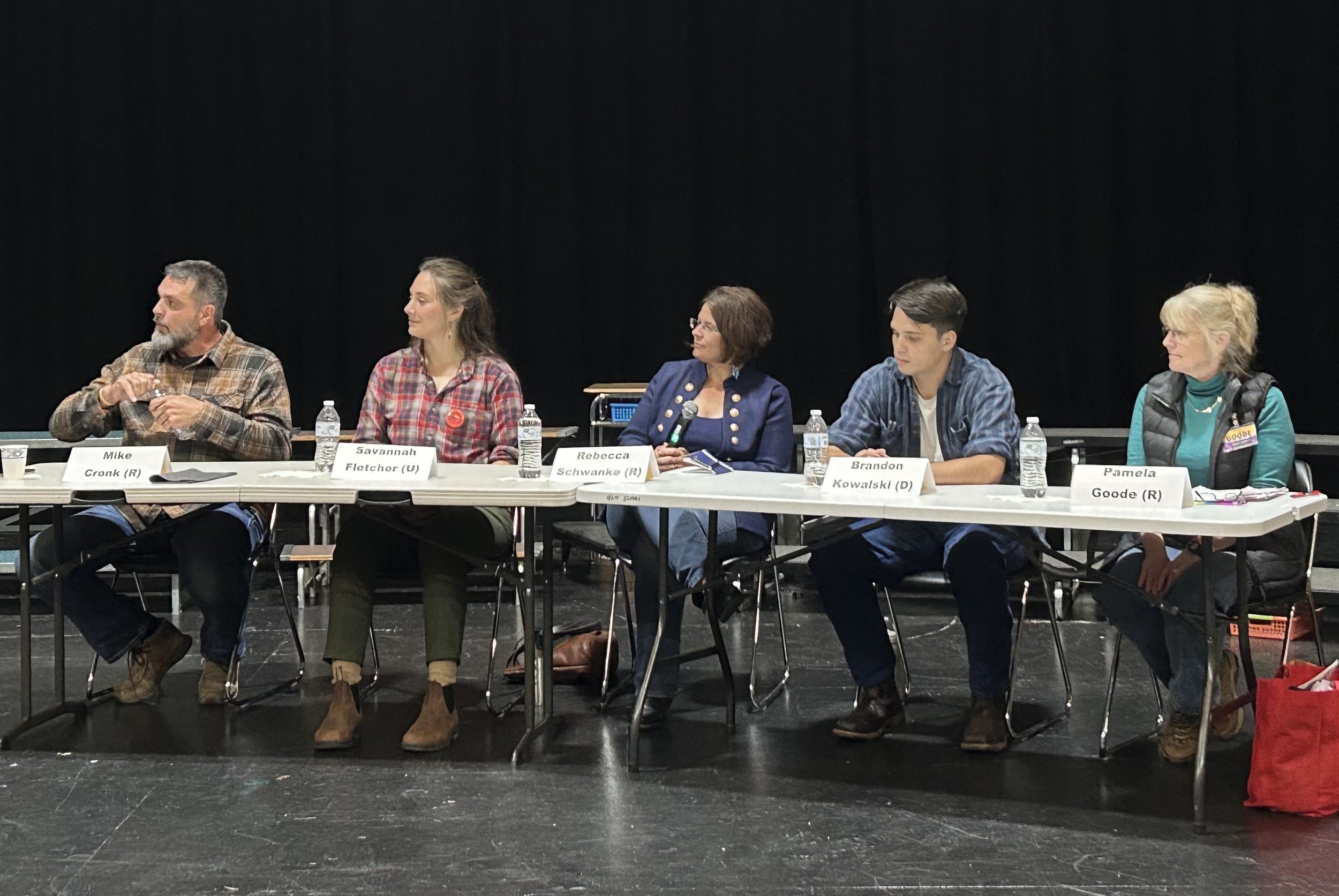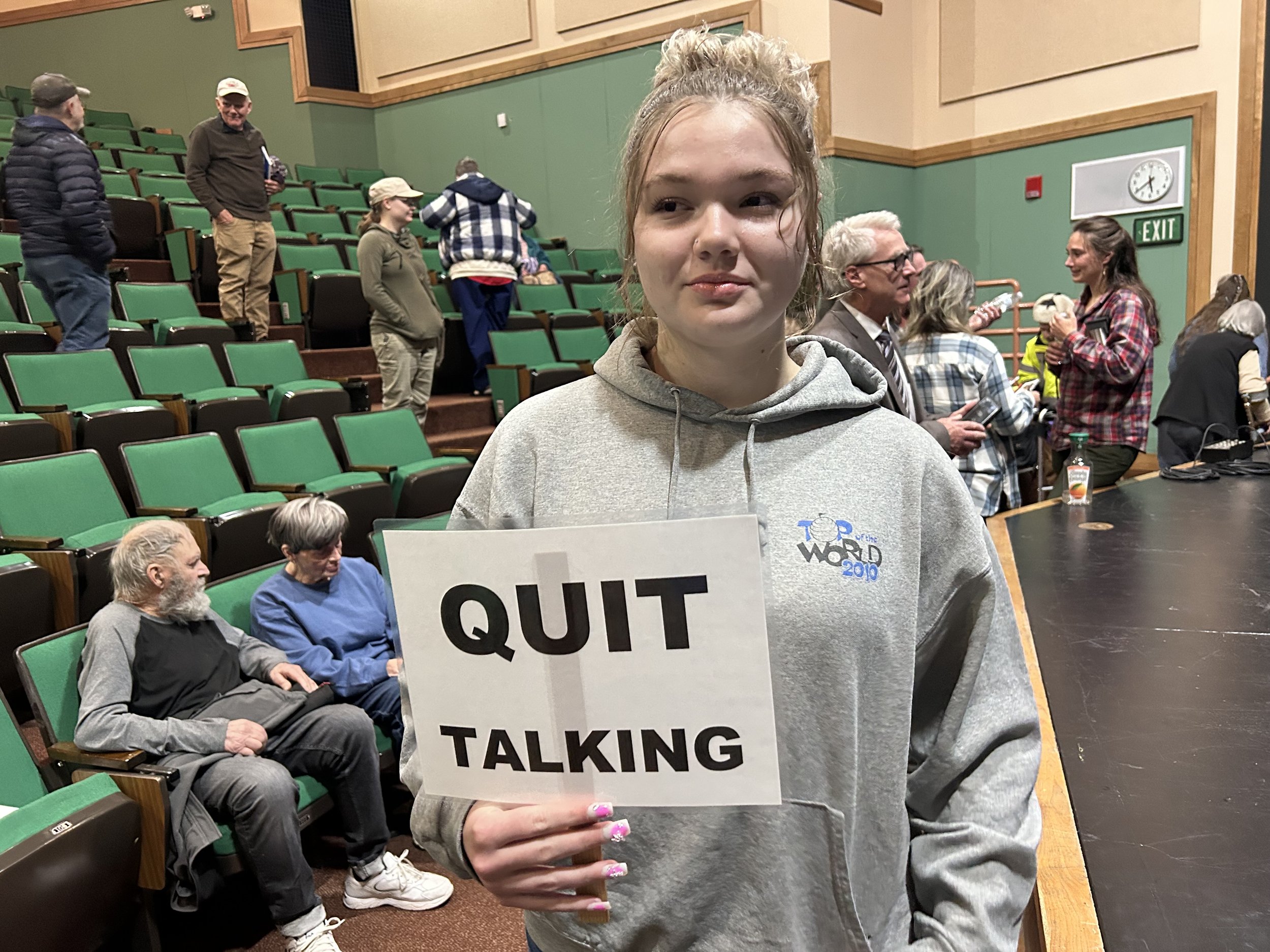Candidates Speak at Local Forum: Part I
Candidates listen to a question at the candidate forum hosted by the Greater Copper Valley Chamber of Commerce at Glennallen High School. Photo by Allison Sayer.
Allison Sayer
On September 26, the Greater Copper Valley Chamber of Commerce hosted a candidate forum at Glennallen High School. It was attended by State Senate candidates Mike Cronk (Republican), and Savannah Fletcher (Undeclared) and State Representative candidates Pamela Goode (Republican), Brandon Putuuqti Kowalski (Democrat), and Rebecca Schwanke (Republican).
The event began with a meet and greet with food provided by the Chamber of Commerce. Circulating around the room, I heard several conversations about education funding. School board member Hannah Bengston came armed with figures to show the candidates the district’s overhead versus its income. Several constituents did not have specific agenda items to discuss with the candidates, but wanted the opportunity to learn more about their positions and backgrounds.
The Chamber of Commerce Board met before the forum to collaboratively produce questions for the candidates. These questions were put to the candidates by CRSD Student Council President Skyler Griffin and Vice President Michael Johnson. The opportunity to speak first and last rotated among the candidates. Government Class students Brejanay Stone, Cheyenne Fields, and Calie Conway acted as timekeepers, keeping the candidates to three minutes per answer.
The candidates had one minute to introduce themselves and their reasons for running.
Cronk highlighted his upbringing in Northway, his early experience as a student athlete, and his work as a teacher and school board member. He is currently the district state representative. Cronk stated he was in office to represent the “rural community,” advocating for “less government,” and advocating for Alaskans who “hunt, fish, and trap.”
Like Cronk, Fletcher cited her past as a student athlete, and stated she was born on Whidbey Island in Washington. She currently serves as the Presiding Officer of the Fairbanks North Star Borough Assembly and works as a civil rights attorney. She also highlighted her volunteer work as a board member of a warming center in Fairbanks. She stated her goal in running is to work for “well funded schools, affordable energy, and thriving fisheries.”
Schwanke stated she was born in Fairbanks and raised in Tok. She cited her experience as a wildlife biologist for the Alaska Department of Fish and Game, as a member of the CRSD Board of Education and her volunteer service teaching hunter education and coaching hockey. She stated she wanted to bring the “rural subsistence, self-sufficient lifestyle to Juneau.”
Kowalski stated that his upbringing was split between Fairbanks and Kotzebue. He said he studied biology at UAF but then went into the trades, working as a structural welder. He stated his motivation to run for office was that there are “crises in our state” that need change. He hopes to see the legislature “coming together for beneficial solutions for our communities.”
Goode stated she is the president of the Deltana Community Corporation, and serves on the rural Deltana Fire Department Auxiliary. She cited past experience working as legislative staff in addition to experience “watching government,” testifying, and proposing policy amendments. She stated that she has the knowledge to “hit the ground running” if elected.
The first question asked the candidates whether emergency services for the Copper Basin should be funded, and if so, how.
Cronk, the only candidate currently in the legislature, stated that he is “working on some kind of funding,” but wonders how to do it “without expanding it to every area” or “have it be something that has to be fought for every year.” He suggested that PILT (Payments in Lieu of Taxes, which according to the US Department of the Interior are “federal payments that help local governments offset losses in property taxes due to the existence of nontaxable Federal lands within their boundaries”) funding could be a potential solution, and hoped some additional federal lands could be included in the program.
Cronk also stated that US Senators Murkowski and Sullivan are working on a “federal money solution” because of the number of people and goods traveling through the area on the highway. However, he also added, “We choose to live in an unorganized borough. We all know the expenses. Nobody is going to want to pay property taxes.” Overall, he stated that his office is “researching and eagerly awaiting answers” for more concrete solutions.
Fletcher stated that emergency services are “critical,” and acknowledged that they had been relying on volunteers who are “aging and getting exhausted.” She pointed out that there are services such as troopers in unorganized boroughs, and asserted that the state “can supplement and provide essential services” without the need to form a borough. She said she would seek to “fund the existing volunteer structures and support those endeavors,” and that the state could support those efforts by helping with training.
Schwanke stated she would “like to have a fully funded ALS [advanced life support] emergency medical service but it’s extremely expensive and the state is already spending money that we don’t have.” She stated that to fund emergency services, “A new revenue source needs to be created or something needs to be sacrificed.” Like Cronk, she suggested examining whether additional lands could be added to PILT funding. She also noted that many villages in District 36 do not have clinics at all or even runways with lights suitable for nighttime use, questioning singling out one area.
Kowalski shared memories of his father volunteering as a firefighter when he was a child in Kotzebue. He praised volunteers for “risking their lives to keep us safe,” and stated, “We need to fund them. There is room. There are decisions that can be made. We need to work on things that are ‘critical.’”
Goode stated that the state budget is too big. She praised local groups for doing emergency medical training. For emergency services, she stated, “I think you’ve got the money here.” Goode also suggested examining the PILT program, stating that the school district currently receives PILT funds but those funds could be distributed to other entities.
Goode stated that there was $100,000 of Community Assistance Program funding available to the Copper Basin from the state which had not been applied for by any entity, and that she had reached out to Copper River EMS (CREMS) to help secure some of those funds. CREMS executive director Matt Lorenz confirmed via email that Goode had reached out to CREMS with funding ideas including accessing $100,000 of “unclaimed” CAP funding. CREMS is still waiting to hear how much CAP funding it will receive, if any.
The candidates were asked about their funding priorities- specifically regarding education, the PFD, and the Department of Transportation (DOT).
Fletcher stated a need for a “holistic view” of state finances. She stated that it is critical to maintain roads. She also referred to the recent rejection of approximately $52 million in proposed federal highway funding due to “errors in paperwork” (For more on this, see a September 15 Anchorage Daily News article by Sean Maguire). She stated it was essential to “utilize the federal dollars that are there.” She stated “schools need to be funded.” She also expressed that supporting biofuel furnaces could help schools to lower heating costs. On the PFD, she said, “People rely on the PFD. It has to stop being a football,” saying she would aim for “a formula that the state would follow and protect for the long term.”
Schwanke stated, “What are the most important investments? Is the money going to give a return on investment? Public education is a mandate. Safe, efficient travel is a mandate. The state can’t make money without proper infrastructure.” Regarding DOT funding, she cited administrative issues interrupting state paychecks as a problem. However, for all of these funding needs, “Improving the revenue stream has to be number one,” citing “presidential orders to stop resource development” as obstacles to state funding. She concluded she was “hoping for a change in November.”
Kowalski stated, “Schools are cornerstones of our communities. We need to be able to fund them.” He also stated that lack of funding is a workforce development issue, and that funding can increase opportunities for shop, welding and other vocational programs in addition to improving college preparation. On the PFD, he stated, “I think we [the candidates] are all going to share: It belongs to us Alaskans. We’re a resource rich state. We shouldn’t be cash poor.”
Goode stated the “state budget is too big. [The state has] taken the pfd and will keep doing it.” She continued, “Public safety, infrastructure, and education are at the top of priorities.” While she acknowledged education needed funding, she also said it was “bigger than just throwing money at it.” She said road systems are important and stated that over time they have improved. Goode stated that the “scope and size of government” should be cut to put funds back into the PFD distribution.
Cronk defended his decision not to vote to override Governor Dunleavy’s veto of a base student allocation (BSA) increase in the last legislative session. He stated that his reasons were “the formula is broken,” and that different districts needed different amounts of money to make ends meet. In conversation before the forum, he had elaborated on this stating that rural schools had high expenses and few students, which would make increased funds based on the number of students a less advantageous solution for them.
Cronk advocated for pooling teachers’ insurance with other state employees’, and for a rewrite of the formula for school funding. Cronk also disparaged the National Education Association, the union representing teachers, although he did not go into specifics. On the PFD, Cronk said that Republicans and Democrats were divided, and implied Republicans were stronger advocates for the PFD. He advocated for better funding for DOT, stating that they are currently understaffed because “the pay is too low. We need to fund it better.”
The candidates’ answers to questions on subsistence hunting and fishing, energy costs, and upcoming ballot measures will appear in our October 10 issue.
The Copper River Record does not endorse any candidate for office, or any candidate position.
Timekeeper Calie Conway demonstrates one of the signs used to tell candidates their time is up. Photo by Allison Sayer.


